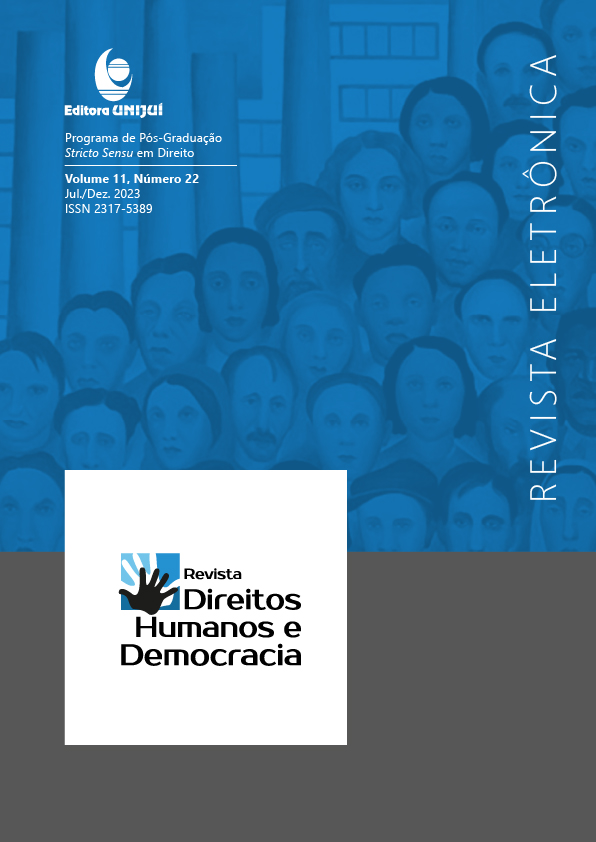O Teste da Proporcionalidade no Tribunal Constitucional do Peru e no Supremo Tribunal Federal
DOI:
https://doi.org/10.21527/2317-5389.2023.22.13607Palabras clave:
Teste da proporcionalidade, Aplicabilidade, Direito comparado, Jurisprudência, Tribunal Constitucional PeruanoResumen
Citas
ÁFRICA DO SUL. Government of the Republic of South Africa v. Grootboom, SA 46 (CC). 2001.
ALEMANHA, Tribunal Constitucional Federal, 2 BVR 1005, 2020.
ALEXY, Robert. Theorie der Grundrecht. Frankfurt am Main: Surkamp, 1994.
ALEXY, Robert. Constitucionalismo discursivo. Tradução Luis Afonso Heck. Porto Alegre: Livraria do Advogado, 2007.
BARRERA, Eloy Espinosa-Saldaña. Informe sobre el principio o test de proporcionalidad en la Jurisprudencia del Tribunal Constitucional peruano. European Commission for Democracy through Law, p. 1-16, 2019.
BRASIL, Lei Complementar 135/2010, Brasília, Presidência da República, 2010. Disponível em: https://www.planalto.gov.br/ccivil_03/leis/lcp/lcp135.htm
BRASIL. Supremo Tribunal Federal. HC 82424. 2004. Disponível em: https://jurisprudencia.stf.jus.br/pages/search/sjur96610/false. Acesso em: 19 abr. 2023.
BRASIL, Constituição Federal da República Federativa do Brasil de 1988. Brasília: Presidência da República, 2016.
BRASIL. Supremo Tribunal Federal. ADC 29. 2012. Disponível em: https://redir.stf.jus.br/paginadorpub/paginador.jsp?docTP=TP&docID=2243342. Acesso em: 19 abr. 2023.
BRASIL. Supremo Tribunal Federal. ADI 5136. 2014. Disponível em: https://jurisprudencia.stf.jus.br/pages/search/sjur282430/false. Acesso em: 19 abr. 2023.
BRASIL. Supremo Tribunal Federal. REXT 601314. 2016. Disponível em: https://redir.stf.jus.br/paginadorpub/paginador.jsp?docTP=TP&docID=11668355. Acesso em: 19 abr. 2023.
BRASIL. Supremo Tribunal Federal. ADI 907. 2017. Disponível em: https://redir.stf.jus.br/paginadorpub/paginador.jsp?docTP=TP&docID=14113979. Acesso em: 19 abr. 2023.
CASTILLO-CÓRDOVA, Luis. El princípio de proporcionalidad em la jurisprudencia del Tribunal Constitucional Peruano. Repositório Institucional PIRHUA, Universidad de Piura, p. 1-22, 2005.
COHEN-ELIYA, Moshe; PORAT, Iddo. Proportionality and Constitutional Culture. Cambridge: Cambridge University Press, 2013.
COHEN-ELIYA, Moshe; PORAT, Iddo. The administrative origins of constitutional rights and global constitutionalism. In: JACKSON, Vicki C.; TUSHNET, Mark (ed.). Proportionality. New frontiers, new challenges. Cambridge: Cambridge University Press, 2017. p. 103-129.
CRAIG, Paul. Proportionality, rationality and review. New Zealand Law Review, Auckland, p. 265-302, 2010.
DYZENHAUS, David. Proportionality and deference and in a culture of justification. In: HUSCROFT, Grant; MILLER, Bradley W.; WEBBER, Gregoire. Proportionality and the Rule of Law. Cambridge: Cambridge University Press, 2018. p. 234-258.
KLATT, Matthias; MEISTER, Moritz. The constitutional structure of proportionality. Oxford: Oxford University Press, 2012.
MASTRODI, Josué. Ponderação de direitos e proporcionalidade das decisões judiciais. Revista de Direito GV, São Paulo, v. 10, n. 2, p. 577-596, 2014.
MENDES, Gilmar Ferreira. A proporcionalidade na jurisprudência do Supremo Tribunal Federal. Repertório IOB de jurisprudência, n. 23/94, p. 469-475, 1994.
MORAES, Fausto Santos de. Ponderação e arbitrariedade: a inadequada recepção de Robert Alexy pelo STF. 2. ed. Salvador: Editora Juspodivum, 2018.
PERU. Tribunal Constitucional. 0010–2000–AI/TC. 2003. Disponível em: https://www.tc.gob.pe/jurisprudencia/2003/00010-2002-AI.html. Acesso em: 19 abr. 2023.
PERU. Tribunal Constitucional. 0007–2006-AI/TC. 2007. Disponível em: https://www.tc.gob.pe/jurisprudencia/2007/00007-2006-AI.html. Acesso em: 19 abr. 2023.
PERU. Tribunal Constitucional. 0032–2010-PI. 2011. Disponível em: https://www.tc.gob.pe/jurisprudencia/2011/00032-2010-AI.html. Acesso em: 19 abr. 2023.
PERU. Tribunal Constitucional. 02437-2013-PA. 2014. Disponível em: https://www.tc.gob.pe/jurisprudencia/2014/02437-2013-AA.pdf. Acesso em: 19 abr. 2023.
PULIDO, Carlos Bernal. El principio de proporcionalidad y los derechos fundamentales. Bogotá: Universidad Externado de Colombia, 2014.
PULIDO, Carlos Bernal. O direito dos direitos: escritos sobre a aplicação dos direitos fundamentais. São Paulo: Marcial Pons, 2013.
REINO UNIDO. Associated Provincial Picture Houses v. Wednesbury Corporation, King’s Bench Division, Court of Appeal, 223, 1948.
ROA ROA, J. E. El Modelo de Constitucionalismo débil y la legitimidad de la justicia Constitucional en Colombia. Serie Documentos de Trabajo, Departamento de derecho constitucional, n. 40, p. 1-20, 2015.
SILVA, Luis Virgílio Afonso da. O proporcional e o razoável. Revista dos Tribunais, São Paulo, ano 91, v. 798, p. 23-50, abr. 2002.
SWEET, Alec Stone; MATHEUS, Jud. Proportionality balancing and global. Columbia Journal of Transnational Law, v. 47, p. 72-164, 2008.
TAGGART, Michael. Proportionality, deference, wednesbury. New Zealand Law Review, Auckland, p. 423-482, 2008.
YOUNG, Katherine. Proportionality, reasonableness, and economic and social rights. In:
JACKSON, Vick C.; TUSHNET, Mark (ed.). Proportionality. New frontiers, new challenges. Cambridge: Cambridge University Press, 2017. p. 248-272.
Descargas
Publicado
Cómo citar
Número
Sección
Licencia
Derechos de autor 2023 Revista Direitos Humanos e Democracia

Esta obra está bajo una licencia internacional Creative Commons Atribución 4.0.
Ao publicar na Revista Direitos Humanos e Democracia, os autores concordam com os seguintes termos:
Os trabalhos seguem a licença Creative Commons Atribuição 4.0 Internacional (CC BY 4.0), que permite:
Compartilhar — copiar e redistribuir o material em qualquer meio ou formato;
Adaptar — remixar, transformar e criar a partir do material para qualquer fim, inclusive comercial.
Essas permissões são irrevogáveis, desde que respeitados os seguintes termos:
Atribuição — os autores devem ser devidamente creditados, com link para a licença e indicação de eventuais alterações realizadas.
Sem restrições adicionais — não podem ser aplicadas condições legais ou tecnológicas que restrinjam o uso permitido pela licença.
Avisos:
A licença não se aplica a elementos em domínio público ou cobertos por exceções legais.
A licença não garante todos os direitos necessários para usos específicos (ex.: direitos de imagem, privacidade ou morais).
A revista não se responsabiliza pelas opiniões expressas nos artigos, que são de exclusiva responsabilidade dos autores. O Editor, com o apoio do Comitê Editorial, reserva-se o direito de sugerir ou solicitar modificações quando necessário.
Somente serão aceitos artigos científicos originais, com resultados de pesquisas de interesse que não tenham sido publicados nem submetidos simultaneamente a outro periódico com o mesmo objetivo.
A menção a marcas comerciais ou produtos específicos destina-se apenas à identificação, sem qualquer vínculo promocional por parte dos autores ou da revista.
Contrato de Licença: Os autores mantém os direitos autorais sobre seu artigo, e concedem a Revista Direitos Humanos e Democracia o direito de primeira publicação.













